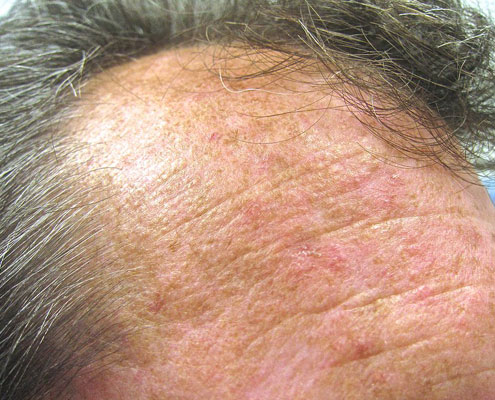Actinic Keratoses Treatment
Actinic Keratoses are scaly spots that usually appear on sun-exposed skin. They are considered “pre-cancers” and can eventually develop into squamous cell carcinomas. Most often, they are a sign of severe sun damage and indicate a much higher likelihood of developing skin cancer.
Treatment of actinic keratoses is usually recommended because of the risk of them evolving into cancer.
There are many ways to treat actinic keratoses. It is important to see one of our dermatology specialists on a regular basis to treat your actinic keratoses and perform an exam to look for skin cancers and other more serious issues.
We specialize in providing expert care for actinic keratoses at all of our dermatology centers in Phoenix, Surprise and Peoria. Our dedicated dermatology specialists are experienced in diagnosing and treating these scaly spots, which are considered precursors to skin cancer. Recognizing the importance of early intervention, our team offers a range of advanced treatment options to address actinic keratoses and minimize the risk of progression to more serious conditions.
Frequently Asked Questions for Actinic Keratoses
- What are actinic keratoses, and why are they concerning? Actinic keratoses are scaly spots that can develop on sun-exposed skin, often indicating severe sun damage. As precursors to skin cancer, particularly squamous cell carcinomas, early treatment is recommended to prevent their progression.
- What are the treatment options for actinic keratoses? Our dermatology specialists offer a variety of treatment options for actinic keratoses, including cryotherapy, topical medications, chemical peels, and photodynamic therapy. These treatments are designed to eliminate or manage the precancerous lesions effectively.
- Why is it important to see a dermatology specialist for actinic keratoses? Dermatology specialists are trained to accurately diagnose and treat actinic keratoses. Regular visits to our centers ensure timely intervention and thorough skin examinations to detect any signs of skin cancers or other serious issues.
- Can actinic keratoses evolve into cancer if left untreated? Yes, actinic keratoses have the potential to develop into skin cancers, such as squamous cell carcinomas. Treating them promptly can significantly reduce the risk of their progression and the associated complications.
- How frequently should I see a dermatology specialist for actinic keratoses treatment? The recommended frequency of visits may vary based on individual factors. Our dermatology specialists will work with you to create a personalized treatment plan and schedule follow-up appointments to monitor and manage your condition effectively.


